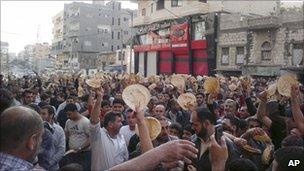Syria protests: Rights group warns of 'Deraa massacre'
- Published

A Syrian human rights group has accused the government of carrying out "10 days of massacres" against protesters in the southern city of Deraa.
The Damascus Center for Human Rights Studies (DCHRS) says snipers and anti-aircraft machine guns are being used to fire on unarmed civilians.
Recent amateur video appears to show dozens of unarmed protesters being shot and bleeding to death on the streets.
The government is trying to quell seven weeks of protests that began in Deraa.
In cities across the country, protesters are calling for greater political rights and personal freedoms. Some are calling for the downfall of the regime of President Bashar al-Assad.
On Thursday, the US and Italy condemned the "brutal crackdown" by the Syrian government on its people.
[Warning: We have included an image lower down this page which some readers may find distressing.]
More than 500 Syrians are thought to have been killed and at least 2,500 others detained. Rights groups say the figure could be much higher.
Despite the violence, activists have vowed to stage a "Day of Defiance" on Friday.
The unrest poses the most serious challenge to four decades of rule by the Assad family in one of the Arab world's most repressive countries.
Foreign journalists are not allowed to enter the country, so it is difficult to verify the reports.
Tanks and snipers
The southern town of Deraa had been a hotbed of protest until troops backed by tanks took control of the city 10 days ago.
In a statement titled "ten days of massacres" the DCHRS says army units have been using anti-aircraft machine guns to shell houses in central neighbourhoods, such as al-Mahata and Daraa al-Balad.
Snipers have been stationed on the rooftops of high buildings and are targeting any moving persons, it adds.
"Dead bodies remain in the streets for more than 24 hours and then disappear," an eyewitness told the DCHRS.
The organisation said 244 bodies had been transferred to the Tishreen Military Hospital in the capital, Damascus, over a two-day period. Many were children, it said, quoting a medic at the hospital.
The source also said 81 bodies of soldiers and army officers had been received. Most were killed by a gunshot to the back.
DCHRS says it strongly suspects that the soldiers were killed for refusing to shoot civilians.
The government says it is taking action against "elements of terrorist groups... to restore security, peace and stability".
'Traitors and dogs'
Amateur footage uploaded on YouTube on 26 April appears to show tanks firing indiscriminately on unarmed protesters. The BBC has not been able to contact the person who shot the video, but it appears to be credible.
The men are heard screaming for ambulances and shouting "You dogs, you traitors, you child-killers, Assad you dog".
The crackdown is not confined to Deraa. In other developments reported by activists and human rights:
- Hundreds of Syrian troops stormed the Damascus suburb of Saqba overnight - breaking into houses and arresting about 300 people, witnesses say. In Douma, there were reports that government-backed "thugs" and security forces had raided two hospitals - Hamdan and Noor. And At least 30 people were arrested in the Damascus district of Tal on Wednesday, including men in their 70s or 80s.
- Elsewhere in the country, troops and tanks are reported to have been sent to the town of Rastan near the central city of Homs, and Baniyas on the coast
Despite the crackdown, small anti-government demonstrations are still being held in several areas, including the central cities of Homs and Hama, and the Damascus suburb of Deraya.
On Wednesday, UN Secretary General Ban Ki-moon called on President Assad to end the clampdown on opposition supporters.
The US has denounced the crackdown as "barbaric" and tightened its sanctions against senior Syrian officials.
Speaking during a visit to Rome on Thursday, Secretary of State Hillary Clinton said that Europe and the US had to work together in the interests of the Syrian people.
"Together we have to show the Syrian government that there are consequences for this brutal crackdown that has been imposed on the Syrian people."